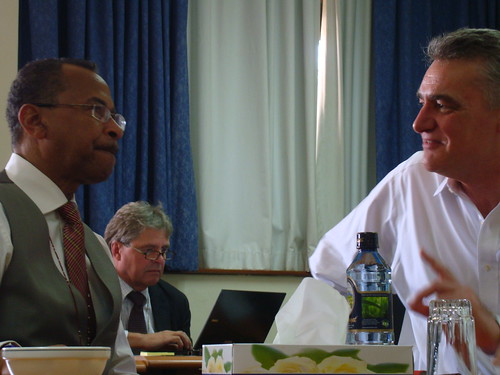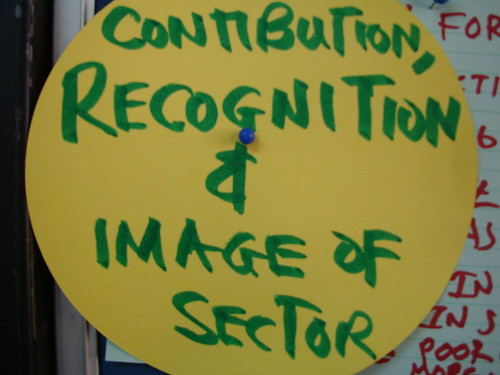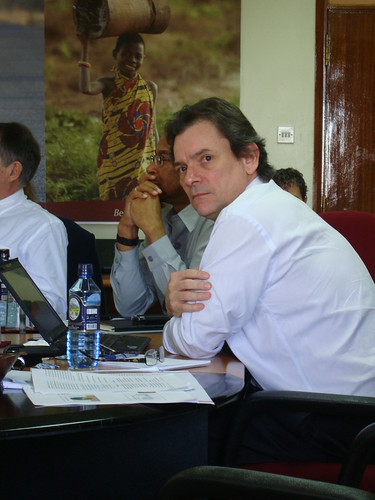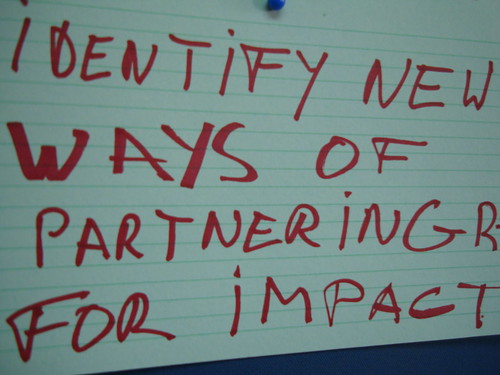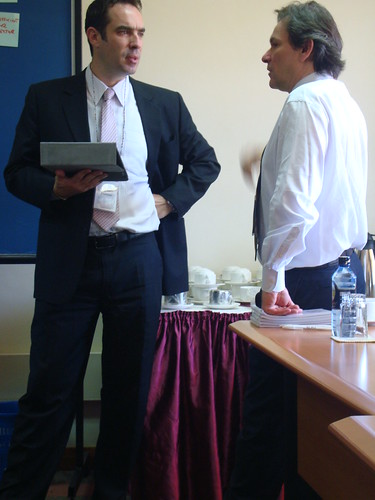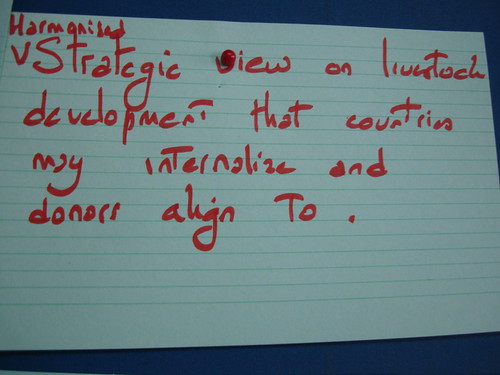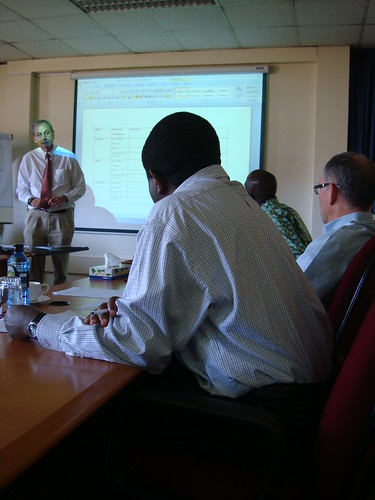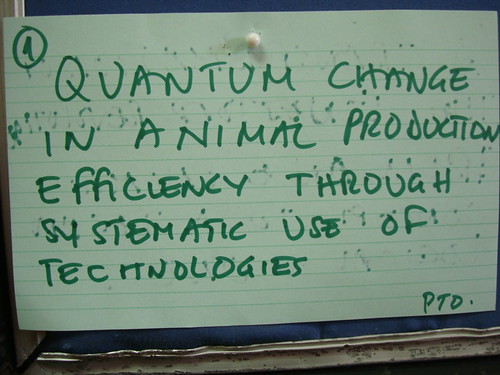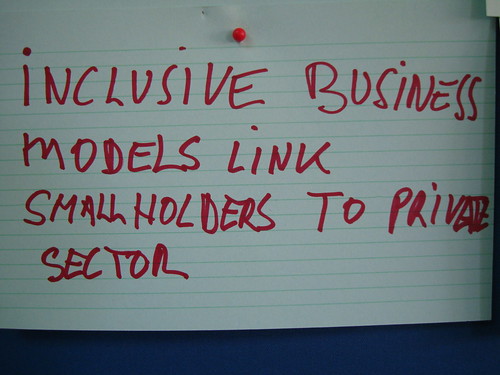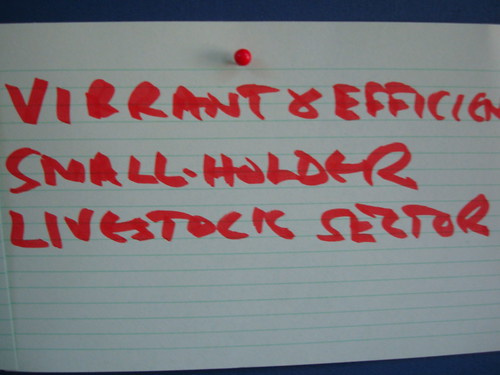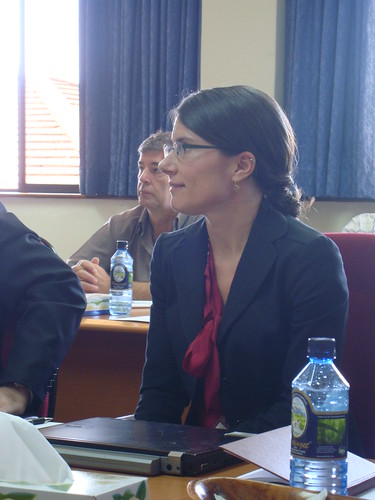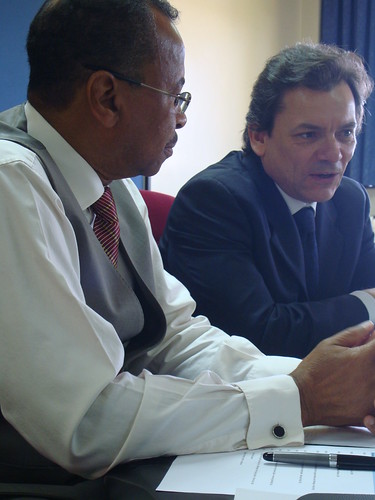ILRI’s Jimmy Smith (left) and FAO’s Henning Steinfeld confer at a high-level consultation for a global livestock agenda to 2020 at ILRI’s Nairobi campus this week.
High-level leaders in the livestock world have agreed on major ways to fulfill on an ambitious global livestock agenda to 2020 that would work simultaneously to protect the environment, human health and socioeconomic equity. The heads of ten agencies met earlier this week in Nairobi to hammer out the outlines of a consensus on strategies for a global livestock agenda to 2020. This High-Level Consultation for a Global Livestock Agenda to 2020 was co-hosted by the World Bank and the International Livestock Research Institute (ILRI).
Three ‘pillars’ for the future of livestock were discussed: the environment, human health and social equity.
Henning Steinfeld, chief of livestock information and policy analysis at the United Nations Food and Agriculture Organization (FAO), gave a presentation on the livestock-environment interface: Global environmental challenges [and livestock].
Bernard Vallat, director general of the World Organisation for Animal Health (OIE), spoke on issues at the livestock-human health interface: Global animal health challenges: The health pillar.
Carlos Seré, chief development strategist at the International Fund for Agricultural Development (IFAD), described livestock and equity issues: Global poverty and food security challenges: The equity pillar.
A major issue raised repeatedly throughout the 1.5-day consultation was the need to work in closer partnership not only to create synergies in institutional work programs but also to begin creating a more coherent narrative for the livestock sector. This new narrative is needed, it was said, both for some simple messaging to counter misunderstandings about the essential role livestock play in the lives and livelihoods of one billion poor people (e.g., dairying in poor countries feeds hungry children and pays for their schooling) and for more nuanced communications that help decision-makers and their constituencies better distinguish among livestock production systems, which vary vastly according, for example, to the different species kept (e.g., the rearing of pigs vs goats vs chickens), the environments in which the animals are raised (remote mountains vs fertile plains vs dry grasslands) and the particular livestock production system being employed (pastoral herding vs mixed smallholder farming vs industrial farming).
François Le Gall, senior livestock advisor at the World Bank, co-hosted an ILRI-World Bank High-Level Consultation on the Global Livestock Agenda by 2020, held in Nairobi, Kenya, 12-13 Mar 2012 (photo credit: ILRI/Susan MacMillan).
Stephane Forman (left) and François Le Gall, both livestock experts at the World Bank (photo credit: ILRI/Susan MacMillan).
ILRI animal health scientist Jeff Mariner led discussions of one of several working groups at the consultation (photo credit: ILRI/Susan MacMillan).
IFAD’s Carlos Seré (left) and Baba Soumare (centre), chief animal health officer at AU-IBAR (photo credit: ILRI/Susan MacMillan).
Walter Masiga and Bernard Vallet of the World Animal Health Organisation (OIE) (photo credit: ILRI/Susan MacMillan).
Kristin Girvetz, program officer at the Bill & Melinda Gates Foundation (photo credit: ILRI/Susan MacMillan).
In total, 14 leaders in global livestock issues took part in this week’s Nairobi consultation:
ASEAN (Association of Southeast Asian Nations)
Soloman Benigno, project manager and animal health expert
AU-IBAR (African Union-Interafrican Bureau for Animal Resources)
Ahmed El-Sawalhy, director
Bruce Mukanda, senior program and projects officer
Baba Soumare, chief animal health officer
BMGF (Bill & Melinda Gates Foundation)
Kristin Girvetz (formerly Grote), program officer
EU (European Union) Delegation to Kenya
Bernard Rey, head of operations
FAO (Food and Agriculture Organization of the United Nations)
Henning Steinfeld, chief of livestock information and policy
IFAD (International Fund for Agricultural Development)
Carlos Sere, chief development strategist
ILRI (International Livestock Research Institute)
Jimmy Smith, director general (co-host)
OIE (World Organisation for Animal Health)
Bernard Vallat, director general
Walter Masiga, sub-regional representative for Eastern Africa and the Horn of Africa
UN (United Nations)
David Nabarro, special representative of the UN secretary general for food security and nutrition (via filmed presentation)
World Bank
Francois Le Gall, livestock advisor at the World Bank (co-host)
Stephane Forman, livestock specialist for Africa
Read more about this consultation on this ILRI News Blog: Developing an enabling global livestock agenda for our lives, health and lands, 13 Mar 2012.
View pictures of the event on ILRI Flickr.

